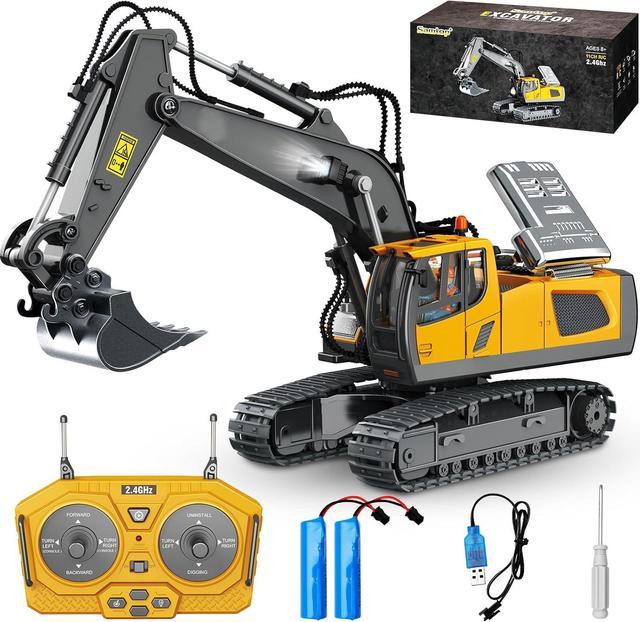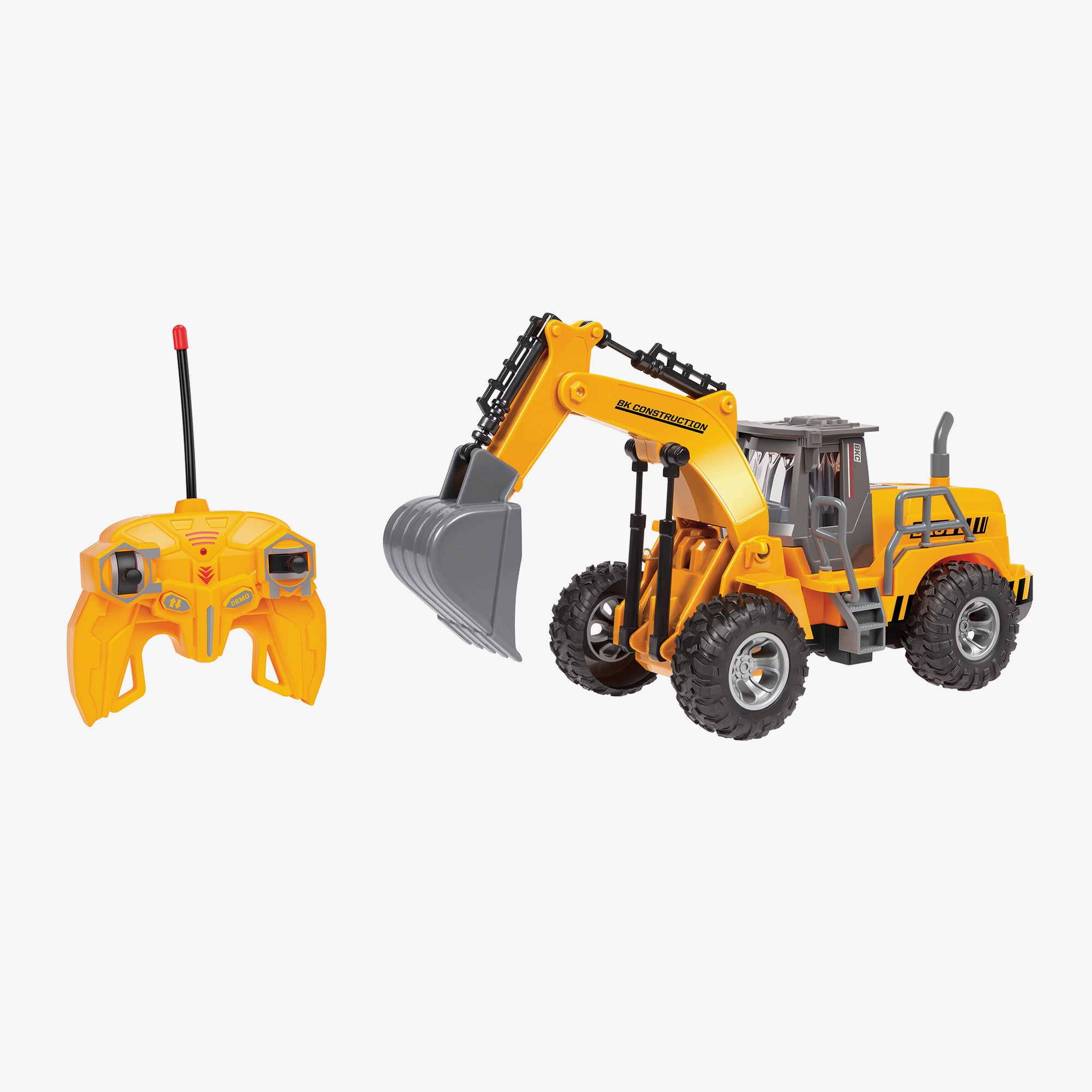Discover the Relevance of Excavator in Modern Construction Projects
Excavators are necessary tools in modern building and construction jobs. Their versatility enables them to carry out a broad variety of jobs, from digging and grading to demolition and site preparation. Advanced attributes, such as hydraulic attachments and GPS, boost their capabilities and performance on job sites. As the market evolves, the value of excavators grows much more. Understanding their duty can reveal understandings right into the future of building practices. What lies in advance for these equipments?
The Flexibility of Excavators in Numerous Projects
Excavators are commonly associated with massive building and construction projects, their versatility allows them to be made use of in a vast array of applications, from household landscape design to utility maintenance. In city setups, excavators can browse limited areas to dig foundations for homes or set up water drainage systems. Their ability to do delicate tasks makes them perfect for landscaping tasks, where they can dig deep into for fish ponds or plant trees. Additionally, excavators play a vital function in energy maintenance, successfully digging trenches for pipes or wires without interrupting surrounding locations. In agricultural applications, they help in land clearing up and soil prep work. In addition, their adaptability allows them to be equipped with different add-ons, enhancing their functionality across different tasks. This multifaceted nature of excavators not only enhances different building procedures however additionally demonstrates their indispensable role in contemporary facilities development and maintenance.
Trick Attributes and Sorts Of Excavators
The discussion on vital functions and sorts of excavators highlights the vital qualities that make these makers very useful in construction. Various excavator kinds, each designed for details tasks, show their convenience and efficiency throughout various applications. rc excavator. Comprehending these classifications and functions is crucial for maximizing their use in modern-day building and construction tasks
Excavator Enters Summary
Excavators play a critical duty in contemporary building and construction, providing versatility and efficiency throughout different tasks. These heavy machinery systems can be found in several types, each customized for specific applications. One of the most typical kinds consist of crawler excavators, known for their stability on uneven surface, and wheeled excavators, which offer greater movement on paved surfaces. Small excavators are favored for limited rooms and small-scale tasks, while long-reach excavators are designed for deep excavating. Additionally, there are specific excavators, such as hydraulic excavators, which improve power and accuracy. Each type includes distinct capacities, making them essential for tasks ranging from excavating and grading to demolition and product handling. Comprehending these variations allows construction specialists to choose the appropriate excavator for their job needs.
Secret Includes Explained
Comprehending the key features of excavators boosts their effective application in construction jobs. Excavators are defined by their effective hydraulic systems, which supply the essential force for digging, lifting, and relocating materials. Their verbalized arms enable a large range of activity, promoting precise procedures in restricted spaces. Furthermore, the selection of add-ons, such as containers, grapples, and augers, increases their convenience to fulfill various project demands. The dimension and weight of excavators additionally add to their stability and ability to move on various terrains. Additionally, innovations in innovation have actually led to the combination of GPS and automation, improving precision and performance in excavation tasks. These functions collectively place excavators as important tools in contemporary building and construction.
Applications in Construction
Transforming building and construction websites, excavators play a pivotal role throughout numerous applications, ranging from household building projects to large framework developments. These functional equipments are equipped for jobs such as excavating foundations, trenching for utilities, and site grading. Various kinds of excavators, including crawler, rolled, and mini excavators, give certain benefits customized to the task needs. Crawler excavators master rough terrains, while rolled excavators supply mobility on paved surfaces. Tiny excavators are ideal for confined spaces, making them popular in urban settings. The efficiency and power of excavators significantly speed up building procedures, making sure prompt task completion. Their flexibility additionally enhances their importance, allowing construction teams to take on a varied selection of obstacles successfully.
Enhancing Performance and Productivity on Job Sites
Taking full advantage of efficiency and efficiency on job websites is a critical purpose in modern building. Excavators play a critical role in attaining this objective by streamlining various jobs. Their ability to do several features-- such as lifting, digging, and grading-- lowers the need for added tools, consequently saving time and resources.Moreover, excavators boost workflow by enabling faster conclusion of projects. With advanced functions like hydraulic add-ons and GPS technology, they can implement exact procedures that minimize mistakes and revamp. This precision not just enhances the top quality of job yet additionally enhances material use, adding to cost savings.The versatility of excavators permits them to adapt to various site conditions, ensuring that jobs proceed smoothly no matter difficulties. By integrating excavators right into construction processes, groups can substantially improve their total performance, resulting in prompt project conclusion and raised earnings.
Safety Benefits of Making Use Of Excavators
Excavators greatly enhance safety and security on building and construction websites with enhanced driver presence and decreased hands-on labor risks. By giving drivers with a clear sight of their surroundings, excavators help to avoid accidents and injuries. Furthermore, the machinery lessens the demand for employees to take part in hazardous hand-operated jobs, better promoting a much safer workplace.
Improved Operator Visibility
Although building websites can be chaotic and loaded with potential risks, enhanced driver visibility plays a vital duty in ensuring safety when using excavators. Modern excavators are made with huge, unobstructed windows and strategically put mirrors, permitting drivers to preserve a clear sight of their environments (rc excavator). This enhanced exposure is vital for identifying pedestrians, various other equipment, and numerous obstacles, considerably lowering the risk of accidents. Furthermore, numerous excavators incorporate innovative innovation, such as sensing units and electronic cameras, to supply drivers with added viewpoints, better enhancing awareness. The capability to see more plainly not just aids in reliable procedure Read Full Article yet likewise fosters a more secure workplace, making it simpler for drivers to navigate complex building and construction sites without compromising safety and security standards
Lowered Manual Work Risks
When manual labor is minimized via the use of excavators, countless safety benefits emerge, considerably improving the well-being of building and construction employees. Excavators minimize the physical stress related to heavy training and repeated tasks, efficiently reducing the danger of musculoskeletal injuries. By automating procedures such as digging, grading, and relocating products, they enable workers to keep a much safer range from possible hazards. Furthermore, excavators are geared up with innovative safety and security attributes, such as rollover defense systems and enhanced operator functional designs, which even more secure personnel on website. The outcome is a significant decrease in work environment crashes and injuries, resulting in raised productivity and morale among construction teams. Eventually, the fostering of excavators adds to a more secure and much more effective building and construction environment.
Excavators in Earthmoving and Website Prep Work
In modern-day construction, a substantial part of earthmoving and website prep work jobs depends on the performance and versatility of excavators. These machines are designed to manage numerous dirt kinds and surface, making them essential for grading, digging, and trenching tasks. Their hydraulic arms can be outfitted with different attachments, such as augers and pails, permitting directory operators to customize their approach based on specific project requirements.Excavators excel at moving big quantities of earth quickly and efficiently, which speeds up the total building timeline. They can browse limited rooms and testing sites where conventional tools may battle, improving productivity. In addition, the accuracy of excavators assurances that site preparation abides by stringent specs, lessening the threat of errors that could lead to expensive rework.
The Role of Excavators in Demolition Tasks
Excavators play a crucial role in demolition jobs, as they possess the power and agility needed to dismantle frameworks successfully. Outfitted with numerous add-ons such as hydraulic breakers, shears, and grapples, these devices can adjust to different demolition demands, whether for small buildings or huge industrial websites. Their versatility allows operators to tackle complex jobs while preserving safety and security and precision.In enhancement to their demolition abilities, excavators promote debris removal, making sure that job sites stay risk-free and well organized. By breaking down frameworks into convenient items, they allow for streamlined clearing up and recycling of materials, lining up with contemporary sustainability efforts.Moreover, excavators can access tight spaces and navigate uneven terrain, making them essential in city demolition projects. On the whole, their durable design and multifunctionality make excavators a crucial property in the demolition phase of building and construction, contributing considerably to task timelines and performance.


Future Patterns in Excavator Technology and Usage
As the building and construction industry develops, improvements in excavator modern technology are positioned to change their use and performance substantially. One considerable pattern is the combination of automation and synthetic intelligence, permitting excavators to run with minimal human treatment. This shift will certainly improve accuracy in tasks such as grading and trenching, minimizing human mistake and enhancing productivity.Additionally, the rise of hybrid and electric excavators is forming a much more sustainable building environment, lowering carbon emissions and fuel prices. Boosted telematics systems are likewise emerging, enabling real-time monitoring of device efficiency and upkeep needs, which can cause better functional performance and longer equipment lifespan.Moreover, advancements in attachment innovation are broadening the flexibility of excavators, permitting them to perform a wider range of tasks. The combination of these trends shows a future where excavators are smarter, greener, and much more adaptable, inevitably reshaping building task characteristics.
Regularly Asked Concerns
Exactly How Do Excavators Compare to Various Other Building And Construction Machinery?
Excavators, identified by their versatility and power, master digging and earthmoving contrasted to other machinery. Their ability to do numerous tasks, including lifting and demolition, makes them essential in building and construction jobs, enhancing general effectiveness.

What Is the Ordinary Lifespan of an Excavator?
The average life-span of an excavator typically varies from 7,000 to 10,000 operating hours, depending upon maintenance, use problems, and design. Correct treatment can extend this life expectancy, ensuring peak performance throughout its operational years.
Just How Are Excavators Maintained for Optimal Performance?
Excavators require regular maintenance for this article peak performance, consisting of routine evaluations, fluid checks, filter replacements, and timely repair services. Applying a preventative maintenance timetable assists prolong their life expectancy and warranties reliable operation in numerous building and construction environments.
What Are the Expenses Related To Purchasing an excavator vs. renting out?
The costs connected with renting versus purchasing an excavator differ considerably. Leasing deals lower upfront expenditures however can collect over time, while acquiring needs a considerable initial financial investment, however provides long-term financial savings and possession ownership advantages.
What Training Is Needed to Run an Excavator?
Running an excavator calls for specialized training, normally consisting of safety methods, equipment procedure strategies, and ecological understanding. Accreditation programs frequently mandate functional experience, making it possible for drivers to handle different tasks effectively while ensuring conformity with industry laws. The most typical kinds consist of spider excavators, known for their stability on uneven surface, and rolled excavators, which provide higher wheelchair on smooth surface areas. Tiny excavators are favored for small-scale jobs and tight areas, while long-reach excavators are made for deep excavating. Additionally, there are specific excavators, such as hydraulic excavators, which boost power and accuracy. Various types of excavators, consisting of spider, rolled, and mini excavators, provide particular advantages customized to the task demands. Crawler excavators excel in rough terrains, while wheeled excavators offer wheelchair on paved surface areas.